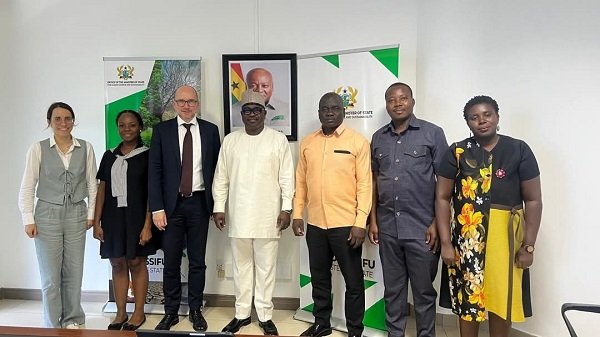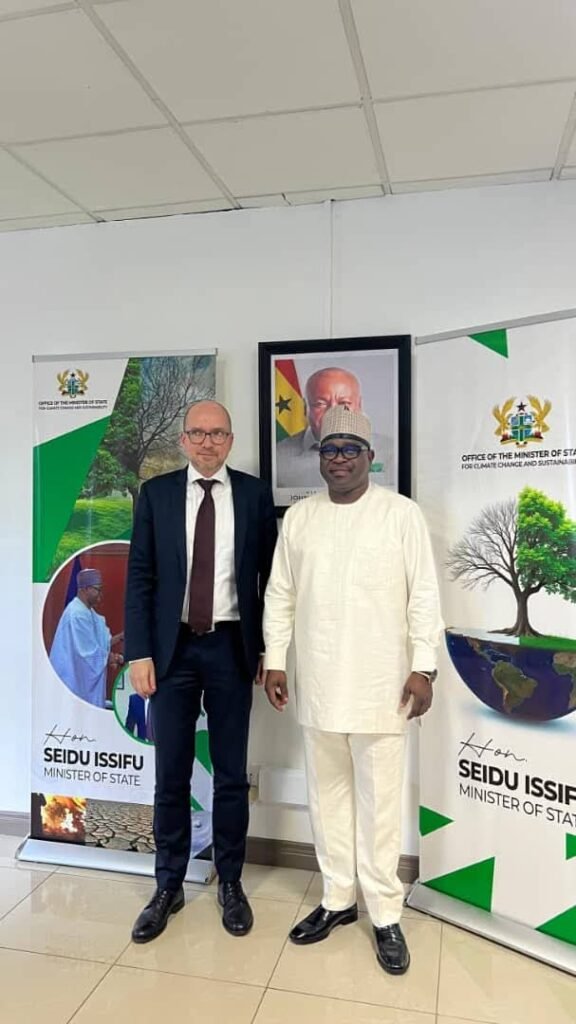News
Austrian ambassador to Ghana commends Mahama for demonstrating commitment to address climate change

The Ambassador of Austria to Ghana, Mr Jürgen Heissel, on Tuesday stated that the appointment of the Minister of State for Climate Change and Sustainability, Mr Seidu Issifu by President John Dramani Mahama demonstrates high-level political commitment to addressing climate change.
Mr Heissel said this when he paid a courtesy call on Mr Siedu, to explore avenues for collaboration in environmental sustainability, renewable energy, climate finance, and green innovation.
Mr Siedu expressed profound gratitude to Mr Heissel for the visit and emphasized that his appointment reflects government’s commitment to combating climate change.
He shared his personal vision to establish a Climate Change and Sustainability Hub as a centre of excellence for research, innovation, and regional cooperation.
Mr Seidu also outlined plans to create Climate Change and Sustainability Units across all ministries, agencies, and District Assemblies, aimed at integrating climate action into public sector planning and delivery.
The Minister shared plans to convene a Climate Business Summit to drive private sector investment and innovation.
Ambassador Heissel welcomed the initiatives and expressed Austria’s interest in aligning its capabilities with Ghana’s priorities.
He highlighted opportunities for institutional exchanges, academic scholarships, and cultural partnerships that could support Ghana’s climate and development goals.
Both parties said they were committed to strengthening bilateral cooperation and turning shared ambitions into practical outcomes for sustainable development.
Ghana is making positive strides in meeting the Nationally Determined Contributions (NDCs) under the Sustainable Development Goals(SDGs) to fight the worst impact of climate change.
As mounting layers of ice at the north and south poles keeps breaking into the sea and causing the sea to rise, vulnerable communities along coastal lines in many countries continue to be pelted by rising seas.
For instance in Ghana, tidal waves is driving people out of their homes, along the Keta lagoon in the Ketu South Constituency, Volta Region.
A fact finding project carried out by the Ghanaian Times had revealed that climate change is pushing familes into poverty, while some young girls of school age are going into prostitution just to make ends meet.
Ghana needs an urgent, deliberate, and resilient climate policy to address this hydra-headed canker in the medium to long term.
No doubt, climate is an existential threat and needs a holistic local and international collaboration.
BY MALIK SULLEMANA
News
Prioritise affordable treatment of sickle cell treatment —Health Expert

Health experts have urged Ghana to prioritise affordable and accessible treatment for sickle cell disease (SCD) as advanced, but costly curative therapies remain out of reach.
SCD, an inherited blood disorder, affects about three in every 100 newborns in Ghana.
Globally, around 1,000 babies are born with the condition daily, with three-quarters in sub-Saharan Africa.
The disease causes severe complications including chronic pain, anaemia, infections, strokes and organ damage, often leading to shortened life expectancy.
In recent years, gene therapy has been developed as a potential cure.
However, its cost—running into millions of dollars per patient—makes it financially and technically inaccessible in Ghana.
According to Dr Lawrence Osei-Tutu, a Sickle Cell and Childhood Cancer Expert at the Komfo Anokye Teaching Hospital, “the country must instead focus on practical, lower-cost interventions such as hydroxyurea”, a decades-old cancer drug proven to reduce painful episodes, hospitalisation and life- threatening complications in SCD patients”.
Taken orally, the medicine improves red blood cell function and is considered safe and effective.
“Hydroxyurea therapy is as good as the cure and a low-hanging fruit to pluck, we must bring a cure to our sickle cell warriors, but do so sustainably.” he urged.
In a chat with The Spectator here, he said to create awareness on the disease, the expert noted that despite its benefits, “hydroxyurea is not widely accessible in Ghana.”
Stressing that, “many patients either cannot afford it or struggle with irregular supply through the health system.”
Moreover, he argued that scaling up access would provide immediate relief while the country builds the infrastructure, trains specialists and secures funding needed to support curative therapies in the future.
With an estimated 15,000 babies born with sickle cell disease annually in Ghana, Dr Osei Tutu cautioned that “failure to improve access to effective treatment will leave many patients vulnerable to preventable complications and early death.”
From Kingsley E. Hope, Kumasi
Join our WhatsApp Channel now!
https://whatsapp.com/channel/0029VbBElzjInlqHhl1aTU27
Hot!
Let’s reintroduce Cultural Studies to complement educational reforms — Tourism Minister

Madam Abla Dzifa Gomashie, the Minister of Tourism, Culture and Creative Arts, has emphasised the importance of reintroducing Cultural Studies in schools as part of Ghana’s broader educational reform agenda.
She said Cultural Studies would complement existing efforts to reposition Science, Technology, Engineering and Mathematics (STEM) and Technical Vocational Education and Training (TVET) to promote digital literacy and expand Creative Arts education.
Speaking at the 2025 Homowo Festival of the people of Ningo-Prampram, held on the theme: “Education: The Best Legacy for our Children,” Madam Gomashie said cultural education was critical to national identity and development.
She noted that the festival’s theme aligned with the Government’s vision to transform education in Ghana and encouraged the youth to embrace it not only as a means of personal development but also as a way of preserving traditional values.
These values, including patience, wisdom, and hard work, were at the core of the Homowo celebration, the Minister said.
“Cultural festivals like Homowo are vital instruments for strengthening cultural identity, preserving historical memory, and fostering national unity. Additionally, festivals serve as platforms for educating the youth through storytelling, music, dance, and other traditional practices, while also providing opportunities for community engagement.”
Madam Gomashie highlighted the strong foundation that Ghana’s tourism was built on, which included culture, traditions, and the creative industry, collectively contributing to over GH¢4.8 billion to the economy.
“Festivals give tourists reasons to visit our country. Therefore, with the right infrastructure and the development of all the domains, the sector can do more than what has been recorded,” she added.
Mr Sam Nartey George, the Member of Parliament for Ningo-Prampram and Minister of Communication, Digital Technology and Innovation, commended the community for their vibrant participation in the festival. He announced plans for the construction of a new nursing training school in Ningo, aimed at expanding access to healthcare education in the area.
Nene Osroagbo Djangmah XII, Paramount Chief of Great Ningo Traditional Area; King Dr Tackie Teiko Tsuru II, Ga Mantse; Nene Tetteh Wakah III, Paramount Chief of the Prampram Traditional Area; Prof. Odaifio Welentsi III, Paramount Chief of the Nungua Traditional Area; Naana Dugbakuwor Dugba II, Paramount Queen Mother of Great Ningo; and Mr. Elvis Afriyie Ankrah, Special Envoy on Religion and Inter-Faith Affairs, who represented the Chief of Staff, were among dignitaries at the festival. -GNA














